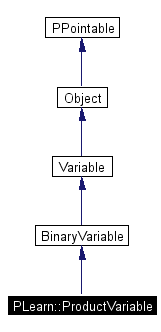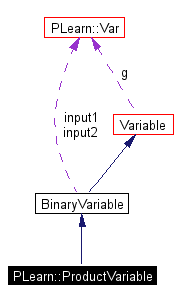
#include <ProductVariable.h>
Inheritance diagram for PLearn::ProductVariable:


Public Member Functions | |
| ProductVariable () | |
| Default constructor for persistence. | |
| ProductVariable (Variable *input1, Variable *input2) | |
| PLEARN_DECLARE_OBJECT (ProductVariable) | |
| virtual void | build () |
| Should call simply inherited::build(), then this class's build_(). | |
| virtual void | recomputeSize (int &l, int &w) const |
| Recomputes the length l and width w that this variable should have, according to its parent variables. | |
| virtual void | fprop () |
| compute output given input | |
| virtual void | bprop () |
| virtual void | bbprop () |
| compute an approximation to diag(d^2/dinput^2) given diag(d^2/doutput^2), with diag(d^2/dinput^2) ~=~ (doutput/dinput)' diag(d^2/doutput^2) (doutput/dinput) In particular: if 'C' depends on 'y' and 'y' depends on x ... | |
| virtual void | symbolicBprop () |
| compute a piece of new Var graph that represents the symbolic derivative of this Var | |
| virtual void | rfprop () |
Protected Member Functions | |
| void | build_ () |
Private Types | |
| typedef BinaryVariable | inherited |
Definition at line 53 of file ProductVariable.h.
|
|
Reimplemented from PLearn::BinaryVariable. Definition at line 55 of file ProductVariable.h. Referenced by ProductVariable(). |
|
|
Default constructor for persistence.
Definition at line 59 of file ProductVariable.h. |
|
||||||||||||
|
Definition at line 60 of file ProductVariable.cc. |
|
|
compute an approximation to diag(d^2/dinput^2) given diag(d^2/doutput^2), with diag(d^2/dinput^2) ~=~ (doutput/dinput)' diag(d^2/doutput^2) (doutput/dinput) In particular: if 'C' depends on 'y' and 'y' depends on x ... d^2C/dx^2 = d^2C/dy^2 * (dy/dx)^2 + dC/dy * d^2y/dx^2 (diaghessian) (gradient) Reimplemented from PLearn::Variable. Definition at line 109 of file ProductVariable.cc. References PLearn::Var::length(), PLearn::product2TransposeAcc(), and PLearn::transposeProduct2Acc(). |
|
|
Implements PLearn::Variable. Definition at line 100 of file ProductVariable.cc. References PLearn::productTransposeAcc(), and PLearn::transposeProductAcc(). |
|
|
Should call simply inherited::build(), then this class's build_(). This method should be callable again at later times, after modifying some option fields to change the "architecture" of the object. Reimplemented from PLearn::Variable. Definition at line 67 of file ProductVariable.cc. References build_(). |
|
|
This method should be redefined in subclasses and do the actual building of the object according to previously set option fields. Constructors can just set option fields, and then call build_. This method is NOT virtual, and will typically be called only from three places: a constructor, the public virtual build() method, and possibly the public virtual read method (which calls its parent's read). build_() can assume that it's parent's build_ has already been called. Reimplemented from PLearn::Variable. Definition at line 74 of file ProductVariable.cc. References PLearn::Var::length(), PLERROR, and PLearn::Var::width(). Referenced by build(), and ProductVariable(). |
|
|
compute output given input
Implements PLearn::Variable. Definition at line 93 of file ProductVariable.cc. References PLearn::product(). |
|
|
|
|
||||||||||||
|
Recomputes the length l and width w that this variable should have, according to its parent variables. This is used for ex. by sizeprop() The default version stupidly returns the current dimensions, so make sure to overload it in subclasses if this is not appropriate. Reimplemented from PLearn::Variable. Definition at line 84 of file ProductVariable.cc. References PLearn::Var::length(), and PLearn::Var::width(). |
|
|
Reimplemented from PLearn::Variable. Definition at line 132 of file ProductVariable.cc. References PLearn::TVec< T >::length(), PLearn::product(), PLearn::productAcc(), and PLearn::BinaryVariable::resizeRValue(). |
|
|
compute a piece of new Var graph that represents the symbolic derivative of this Var
Reimplemented from PLearn::Variable. Definition at line 122 of file ProductVariable.cc. References PLearn::productTranspose(), and PLearn::transposeProduct(). |
 1.3.7
1.3.7